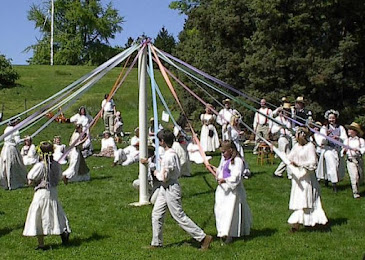Beltane and the Last Day of Ridván

Beltane is a Celtic holiday and one of the eight Sabbats. It falls somewhere between the spring equinox (Ostara) and the approaching summer solstice, Litha. The occasion celebrates spring at its pinnacle and the approaching summer. Beltane additionally now and again goes by the name May Day since it is on May first. This occasion is related unequivocally to ripeness and numerous outside celebrations.
This celebration is frequently honoured with huge fires, maypoles, moving, and performing fruitfulness ceremonies. Beltane is a Celtic word, signifying "the flames of Bel." Bel probably alluded to the Celtic sun god, Belenus. The Celts used to light two huge fires since they accepted it would sanitize themselves, as well as increment their ripeness. They would pass cows between the two flames, with the conviction that it would refine the dairy cattle, and guarantee the fruitfulness of the group. Albeit this is certainly not a custom that is rehearsed now, present-day agnostics actually light huge fires and practice fruitfulness ceremonies on this day.
Cutting-edge agnostics observe Beltane in different ways. One method for celebrating is with a maypole. In this custom, a shaft is set in a field with strips connected. Every individual (typically ladies and young ladies) will seize their own lace, and dance around the shaft in an exceptional manner, in order to mesh the strips into a particular example. This is one of the more normal ripeness ceremonies that could happen on this day. Celebrators likewise could mesh blossoms into their hair, or make a botanical wreath to wear on their heads as a festival of spring. A few agnostics light a huge fire and dance around (or are considerably done with everything, which is one more typical fruitfulness custom for the afternoon. Finally, certain individuals get ready "May containers," and fill them with blossoms and altruism. They give the bushels to somebody needing care, like an older companion, or somebody who is recuperating from an ailment.
From the night of May 1 to the night of May 2 Baha'i's will praise the last and Twelfth Day of Ridván. Ridván, which means heaven, is a twelve-day Baha'i celebration that recognizes the notable occasions during which Bahá'u'lláh, the pioneer behind the Baha'i confidence, pronounced himself the courier of God. The occasion is named for the Nursery of Ridván wherein he made the announcement. The first, 10th, and twelfth days are the heavenly days of the celebration. They mark Bahá'u'lláh's appearance, the appearance of his family, and their takeoff from the nursery, individually.
After his appearance in the nursery, Bahá'u'lláh made his statement interestingly to a little gathering of loved ones. For the following eleven days, Bahá'u'lláh got numerous guests. In any case, his family couldn't go along with him until April 30, the 10th day, on the grounds that the Tigris Waterway had risen and made travel to the nursery troublesome. On the twelfth day of their visit, Bahá'u'lláh and his family passed on the nursery and began their excursion to Constantinople. He was ousted by the public authority of the Ottoman Realm because of their anxiety toward the Baha'i confidence to be specifically, how rapidly it spread and how well-known it was becoming.
Baha'i cautiously consider Bahá'u'lláh's exile while commending the Twelfth Day of Ridván. They see this occasion as a social affair in supplication and festivity. School and work are precluded on the Twelfth Day of Ridván on the grounds that it is a heavenly day.


Comments
Post a Comment